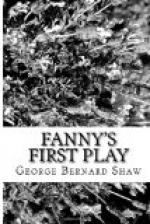Savoyard. No: Mrs William Tinkler. Dont forget.
The footman. Mrs Tinkler, sir. Right, sir. [The Count comes in through the curtains]. Here is the Count, sir. [Announcing] Mr Cecil Savoyard, sir. [He withdraws].
Count O’DOWDA. [A handsome man of fifty, dressed with studied elegance a hundred years out of date, advancing cordially to shake hands with his visitor] Pray excuse me, Mr Savoyard. I suddenly recollected that all the bookcases in the library were locked—in fact theyve never been opened since we came from Venice—and as our literary guests will probably use the library a good deal, I just ran in to unlock everything.
Savoyard. Oh, you mean the dramatic critics. M’yes. I suppose theres a smoking room?
The count. My study is available. An old-fashioned house, you understand. Wont you sit down, Mr Savoyard?
Savoyard. Thanks. [They sit. Savoyard, looking at his host’s obsolete costume, continues] I had no idea you were going to appear in the piece yourself.
The count. I am not. I wear this costume because—well, perhaps I had better explain the position, if it interests you.
Savoyard. Certainly.
The count. Well, you see, Mr Savoyard, I’m rather a stranger in your world. I am not, I hope, a modern man in any sense of the word. I’m not really an Englishman: my family is Irish: Ive lived all my life in Italy—in Venice mostly—my very title is a foreign one: I am a Count of the Holy Roman Empire.
Savoyard. Where’s that?
The count. At present, nowhere, except as a memory and an ideal. [Savoyard inclines his head respectfully to the ideal]. But I am by no means an idealogue. I am not content with beautiful dreams: I want beautiful realities.
Savoyard. Hear, hear! I’m all with you there—when you can get them.
The count. Why not get them? The difficulty is not that there are no beautiful realities, Mr Savoyard: the difficulty is that so few of us know them when we see them. We have inherited from the past a vast treasure of beauty—of imperishable masterpieces of poetry, of painting, of sculpture, of architecture, of music, of exquisite fashions in dress, in furniture, in domestic decoration. We can contemplate these treasures. We can reproduce many of them. We can buy a few inimitable originals. We can shut out the nineteenth century—
Savoyard. [correcting him] The twentieth.
The count. To me the century I shut out will always be the nineteenth century, just as your national anthem will always be God Save the Queen, no matter how many kings may succeed. I found England befouled with industrialism: well, I did what Byron did: I simply refused to live in it. You remember Byron’s words: “I am sure my bones would not rest in an English grave, or my clay mix with the earth of that country. I believe the thought would drive me mad on my deathbed could I suppose that any of my friends would be base enough to convey my carcase back to her soil. I would not even feed her worms if I could help it.”




